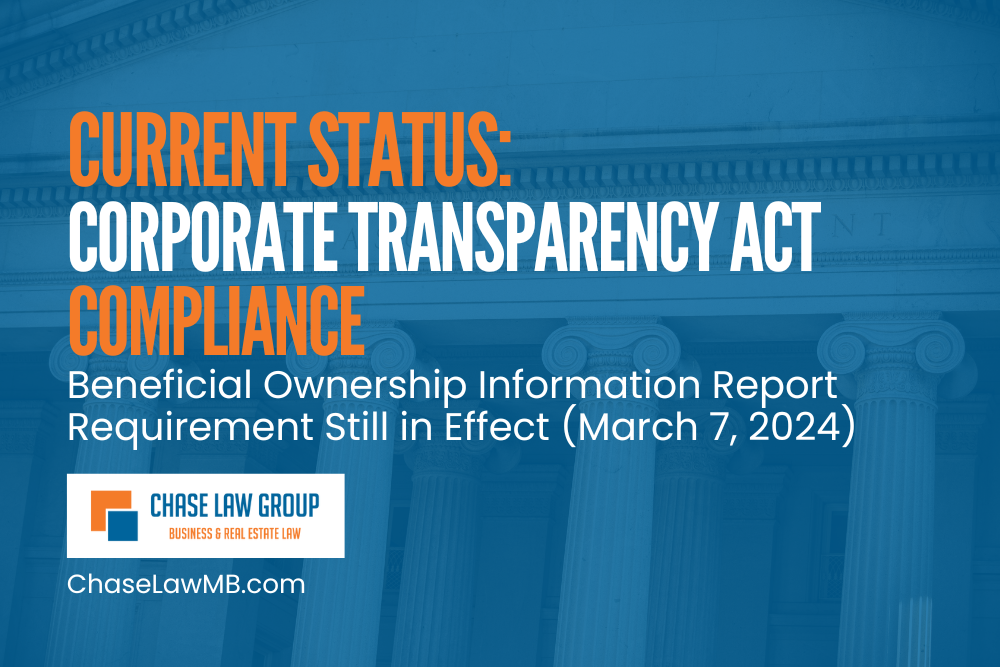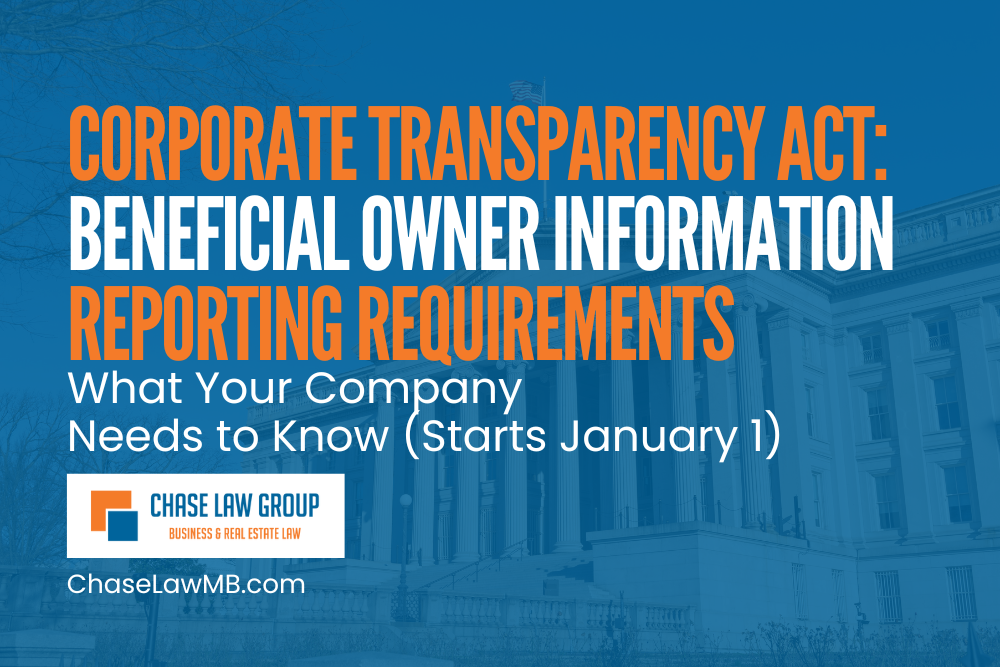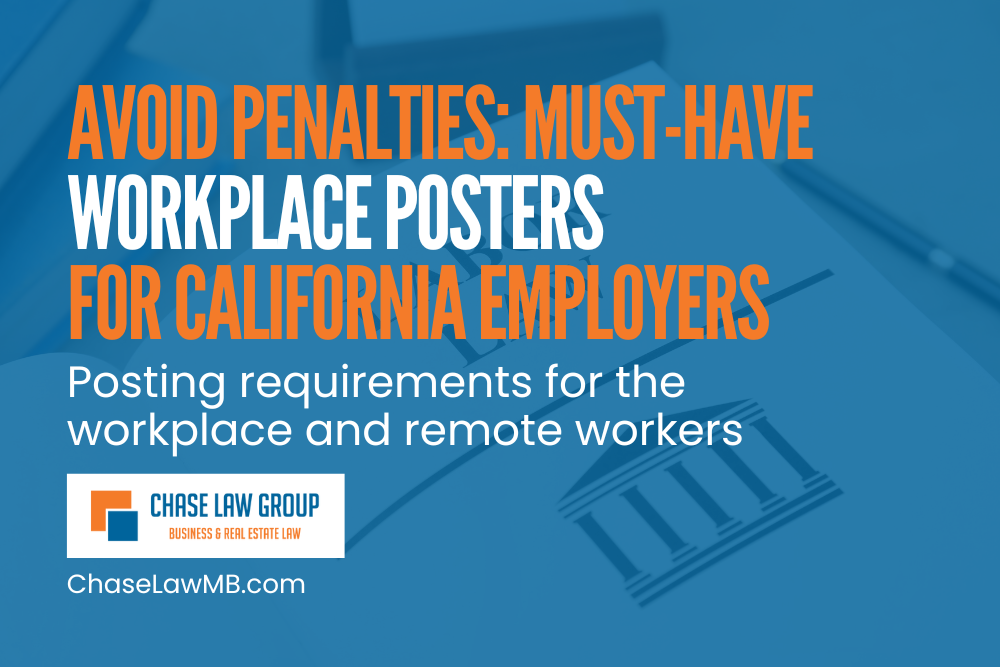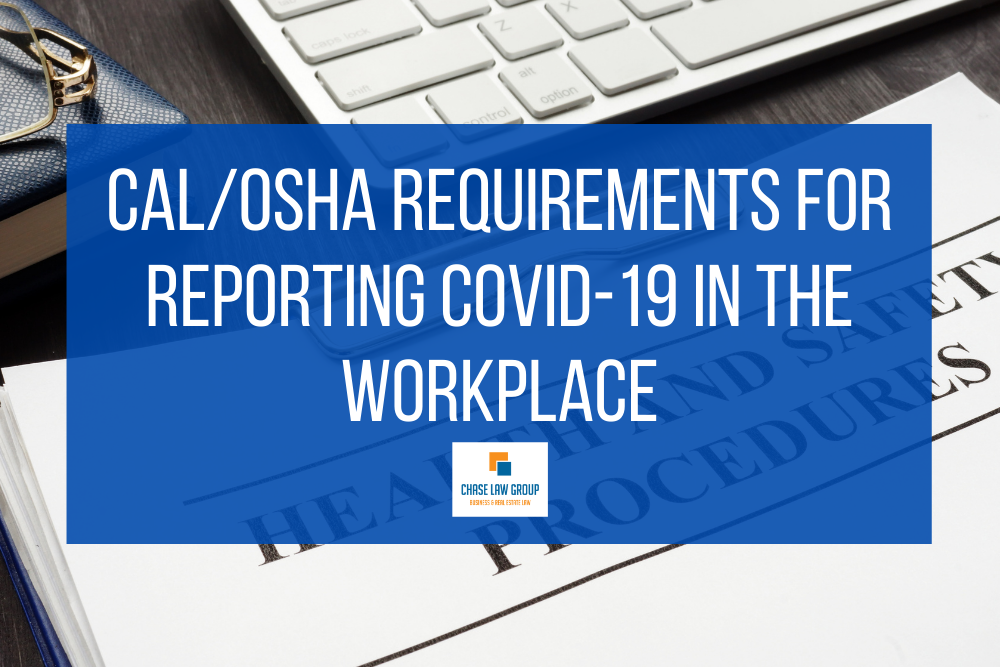Legal Spring Cleaning: Why Every Business Needs an Attorney
By Admin March 28, 2024 Category: Compliance

As spring approaches, we urge business owners to prioritize their compliance with corporate, federal, and legal requirements. It's a critical step in ensuring your business stays on track and avoids potential pitfalls down the road. Here's how Chase Law Group, with its wealth of experience and expertise, can guide you through each aspect of compliance and beyond: Tailored Expertise Across Industries and Stages: With years of experience assisting businesses of all sizes, types, and industries, our firm understands the unique challenges you face. Whether you're a startup carving out your niche, a growing enterprise navigating expansion, or an established corporation... READ MORE
Current Status of Corporate Transparency Act Compliance (March 7, 2024)
By Admin March 07, 2024 Category: Compliance

At Chase Law Group, we've had several inquiries with regard to the status of compliance with the Corporate Transparency Act (“CTA”) in light of the March 1, 2024 ruling by the federal district court in the Northern District of Alabama in the National Small Business United v. Yellen, No. 5:22-cv-01448 (N.D. Ala.) wherein the court found the CTA to be unconstitutional and enjoined enforcement of the CTA as to the parties in that case only. In a notice issued by the Financial Crimes Enforcement Network (FinCEN) on March 4, 2024 with regard to the ruling, FinCEN advised that “the government... READ MORE
What’s in store for 2024? Regulations That Could Impact Small Businesses
By Admin January 29, 2024 Category: Compliance

As we step into 2024, small businesses may face evolving regulations. From the Corporate Transparency Act to the nuanced IRS reporting rules and the watchful eye of the Consumer Financial Protection Bureau (CFPB), business owners must be aware of these areas. In this article, we share a few key regulatory changes to keep an eye on for 2024. Stay informed, stay compliant, and stay ahead with these insights. Corporate Transparency Act & Registering with FinCEN Starting on January 1 2024, your company may be required to report information about the people who own or control it to the US Treasury... READ MORE
Keeping Your Corporate Minutes Updated – Why Does It Matter?
By Admin December 20, 2023 Category: Compliance

It's easy to overlook updating corporate minutes amidst the hustle and bustle of running a small business. However, neglecting this essential responsibility can have significant consequences for the health and success of your company or organization. Corporate minutes serve as a crucial record of key decisions and actions taken during company meetings, and maintaining accurate and up-to-date records can be a game-changer for small businesses. Even for single-owner companies, keeping your corporate minutes updated still remains pivotal. While the process may be less complex, not having multiple stakeholders, it is just as important for maintaining legal clarity and safeguarding the... READ MORE
Corporate Transparency Act & Beneficial Owner Information Reporting: What Your Company Needs to Know (Starts Jan 1 2024)
By Admin September 28, 2023 Category: Business Law

Starting on January 1 2024, your company may be required to report information about the people who own or control it to the US Treasury Department’s Financial Crimes Enforcement Network (FinCEN). FinCEN promotes national security and protects the US financial system from fraud and abuse by criminals and corrupt officials. In 2021, Congress passed the Corporate Transparency Act which creates a new requirement for many companies formed or operating in the US to report their Beneficial Ownership Information (BOI) to FinCEN. This reporting requirement aims to enhance transparency and accountability within corporate structures, contributing to a more secure and transparent financial... READ MORE
Avoid Penalties: Must-Have Workplace Posters for California Employers
By Admin May 18, 2023 Category: Business Law

By Scott Liner, Employment Attorney California employers must meet all state and federal requirements related to posting employment-related information in the workplace. Specifically, the California Department of Industrial Relations requires employers to post information related to wages, hours and working conditions in an area frequented by employees where it may be easily read during the workday. The required posters can be seen here by clicking on this link to the Department of Industrial Relations. Federal law required postings can be viewed by clicking here. Many of the workplace posters are available at no cost from the requiring agency or can... READ MORE
Surviving Inflation: Tips for Small Business Owners to Keep Customers, Employees, and Profitability Afloat
By Admin March 27, 2023 Category: Business Law

Inflation can be a challenging economic situation for small business owners. Rising prices of goods and services can make it difficult to keep your customers happy, pay your employees, and stay in business. So how can small business owners adapt to inflation and thrive in a challenging economic environment? Here are some strategies to consider adopting and how Chase Law Group can help. Manage Costs: One of the most effective ways to adapt to inflation is to manage costs effectively. This means taking a hard look at your business expenses and finding ways to reduce them without compromising on quality.... READ MORE
New Employment Laws Coming in 2023: Time to Update Your Employee Handbooks
By Admin November 10, 2022 Category: Business Law

It's that time of year when we update you on upcoming changes to the employment law landscape and for you to take the opportunity to update your employee handbooks and policies. Below we set forth the newly passed legislation that that takes effect January 1, 2023 that impacts employers. Expansion of CFRA Leave for Designated Person AB 1041 expands who an employee can take leave to care for under both the California Family Rights Act (CFRA) and California’s paid sick leave law. Beginning January 1, 2023, employees can take CFRA leave or paid sick leave to care for a “designated... READ MORE
New Federal Law Bars Arbitration of Sexual Assault and Sexual Harassment Claims
By Admin March 24, 2022 Category: Business Law

In March 2022, President Biden signed into new law the Ending Forced Arbitration of Sexual Assault and Sexual Harassment Act (EFASASHA), barring the enforcement of most mandatory arbitration provisions in cases alleging sexual assault or sexual harassment. The EFASASHA will apply to all pre-dispute arbitration clauses, including those in contracts executed before the law’s enactment. The law will also invalidate pre-dispute agreements that waive an employee’s right to participate in a joint, class or collective action in court, arbitration or any other forum that relates to a sexual assault or sexual harassment dispute. Moreover, if a dispute arises about whether... READ MORE
Cal/OSHA requirements for reporting COVID-19 in the workplace
By Admin July 29, 2021 Category: Business Law

Cal/OSHA has enacted a standard detailing notification and reporting requirements for when there is a COVID-19 case in the workplace. Per the standard, a COVID-19 case is defined as someone who: Has a positive COVID-19 test;Has a positive COVID-19 diagnosis from a licensed healthcare provider;Is subject to a COVID-19-related order to isolate issued by a local or state health official; orHas died due to COVID-19, in the determination of a local health department or per inclusion in the COVID-19 statistics of the country. Under Cal/OSHA’s standard, when the employer knows or should have known there is a COVID-19 case in... READ MORE

